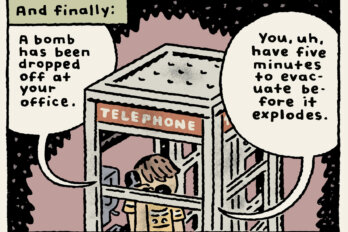I struggled with how to contribute to this evening’s conversation on creativity. The other speakers here are obvious creators. As a gossip blogger, talk show host, and entertainment reporter, I think I talk shit about creative people in a really creative way—but no one really thinks of me as someone who actually creates anything.
Part of my, let’s call it, insecurity about being included among a list of creators is that I am firmly planted on the low culture side of the discussion, while they, clearly and obviously, represent high culture. They are the pride of the panel. If we were all on a sinking boat, they’d be at the front, to be rescued first, for preservation, and I’d be over there in the back. If we have room, we’ll save her—but if she drowns, well, no big loss.
I feel like that’s the place that low culture represents. Low culture, by its very name, is down here—the scab of society. High culture is the art. You have no problem citing lines from Shakespeare: high culture. But you sheepishly admit to knowing all the names of Taylor Swift’s boyfriends: low culture.
But all art is storytelling. Even gossip is storytelling. Let me go one step further: low culture can exist without high culture, but can high culture exist without low culture? Or does the low drive the high? If high culture is the summit of creativity, is low culture the birthplace of creativity?
If there was such a thing as the Faculty of Celebrity Studies here, at my alma mater, Western University, I would hope that the academic endeavour would be to validate gossip: not just as the spark of high culture, but as its actual origin.
But first, what is the origin of gossip itself? Last month, the BBC investigated how gossip came to be, reporting that right now, researchers at universities in the UK are working on the hypothesis that gossip evolved out of grooming. Grooming was how our ancestors forged social bonds. But grooming can’t be scaled. You can only groom one or two others at a time, so as our brains got bigger, we developed verbal communication. As those skills became more sophisticated, gossip was born; it came into existence as we became more intelligent. According to philosopher Julian Baggini, gossip is “a moral appraisal of other people, it’s about the judgement of what people are doing and whether it’s right or wrong, good or bad.” When our brains first started growing, we morally appraised each other, or gossiped about each other and our skills for survival:
Who do you think is a better stick gatherer? Joe or John? Well, Joe’s kind of slow and it takes him a long time to figure things out. If we put Joe in charge, we’ll freeze to death because he’s too stupid to come back in time with the sticks we need. Let’s send John.
Modern equivalent? The Daily Mail in London is reporting that Queen Elizabeth has grounded her son Prince Andrew, and is sending her grandson Prince Harry to represent her overseas instead, because Andrew allegedly slept with a hooker.
Gossip kept Neanderthals warm. High culture. And gossip is saving the royal family. Low culture.
Still, gossip continues to have a bad reputation, even though prestigious institutions are defending it. In 2014, Stanford University published a study that determined gossip can improve society by identifying bullies, ostracising their behaviour, and then inviting the offenders back by showing them how to reform, which, in turn, promotes cooperation.
Basically, the bitching and gossiping we’ve engaged in about what a little punk Justin Bieber has been over the last two years has served to illuminate the dark side of child entitlement and child stardom. We’ve been doing him a favour! And look, he’s on a tour of contrition now, showing up on the Ellen DeGeneres show to apologise for what an asshole he has been. Instead of pissing in restaurants and egging people’s houses, he’s now going bowling with senior citizens and taking his shirt off all the time.
Gossip did that. You’re welcome.
In addition to creativity’s benefit to society, how is gossip contributing to the arts? How is low culture informing high culture?
Thematically, low culture has been inspiring high culture for thousands of years. In ancient Egypt, tabloids took the form of hieroglyphics. Servants would etch symbols into the walls to tell each other who was fucking who in the royal court. Apparently there was a queen depicted in a series of really flexible body positions with one of her ministers. And a king who used to make late-night visits to one of his advisors in the middle of the night. Back then they called it gossip. Now we’ve rebranded that “history” and “archaeology.” Low culture becomes high culture. It’s cultural alchemy.
There’s evidence of this in literature too, turning the base into precious. After all, what are the recurring themes of gossip? Love, hate, discovery, jealousy, obsession, betrayal, mean-girling, et cetera. Taylor Swift and Katy Perry first started hating each other over John Mayer and then, later, over a few backup dancers. It’s just like Hippolyta and Titania love-triangling each other over Oberon in Shakespeare’s A Midsummer Night’s Dream—which I read while here at Western, when I wasn’t skipping English Lit.
Love, hate, discovery, jealousy, obsession, betrayal, mean-girling: that’s pretty much the subtitle to Macbeth.
Shakespeare wrote soap operas. He wrote for an audience that understood the soap opera, and for an audience that, for the most part, couldn’t read. But they didn’t have to appreciate the fundamental blocks of storytelling. They didn’t need to be elite to recognise the gossip in his art, to understand that the gossip inspired his art, or to know that without the gossip there would be no art.
Because without Beyoncé, you’d never be able to say, “I woke up like this.” You wouldn’t appreciate the awesome power of a wind machine. You wouldn’t feel so guilty about spending so much time wondering what happened in that elevator. You know that video of Beyoncé’s sister, Solange, going full Mike Tyson on Jay Z? Well, you don’t even have to. Not when Harvard Business School has published a case study on the business of being Beyoncé.
If Harvard cares about what happened in that elevator, it’s OK for you to care about what happened in that elevator. And I know this isn’t what you want to hear, but I gather it had more to do with Solange’s needs than whatever was going on with the Carters. Rumour has it that Solange is allegedly hard up for cash. And Beyoncé and Jay Z shop for real estate in the neighbourhood of $70 million. It’s textbook sibling rivalry; just like Kate and Bianca in The Taming Of The Shrew, Cal and Aron Trask in East Of Eden, or Michael and Fredo Corleone in The Godfather.
All of which we could discuss much more elaborately if this institution of higher learning could fulfill my dream. If you build a Faculty of Celebrity Studies here at Western University, I promise you, I will be the first to enroll.





